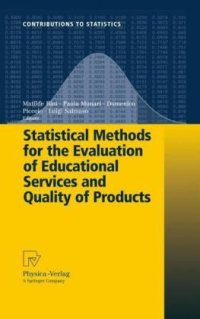
Ebook: Statistical Methods for the Evaluation of Educational Services and Quality of Products
- Tags: Statistics for Social Science Behavorial Science Education Public Policy and Law, Assessment Testing and Evaluation
- Series: Contributions to Statistics
- Year: 2009
- Publisher: Physica-Verlag Heidelberg
- Edition: 1
- Language: English
- pdf
The book presents statistical methods and models that can usefully support the evaluation of educational services and quality of products. The evaluation of educational services, as well as the analysis of judgments and preferences, poses severe methodological challenges because of the presence of the following aspects: the observational nature of the context, which is associated with the problems of selection bias and presence of nuisance factors; the hierarchical structure of the data (multilevel analysis); the multivariate and qualitative nature of the dependent variable; the presence of non observable factors, e.g. the satisfaction, calling for the use of latent variables models; the simultaneous presence of components of pleasure and components of uncertainty in the explication of the judgments, that asks for the specification and estimation of mixture models. The contributions concern methodological advances developed mostly with reference to specific problems of evaluation using real data sets.
The book presents statistical methods and models that can usefully support the evaluation of educational services and quality of products. The evaluation of educational services, as well as the analysis of judgments and preferences, poses severe methodological challenges because of the presence of the following aspects: the observational nature of the context, which is associated with the problems of selection bias and presence of nuisance factors; the hierarchical structure of the data (multilevel analysis); the multivariate and qualitative nature of the dependent variable; the presence of non observable factors, e.g. the satisfaction, calling for the use of latent variables models; the simultaneous presence of components of pleasure and components of uncertainty in the explication of the judgments, that asks for the specification and estimation of mixture models. The contributions concern methodological advances developed mostly with reference to specific problems of evaluation using real data sets.